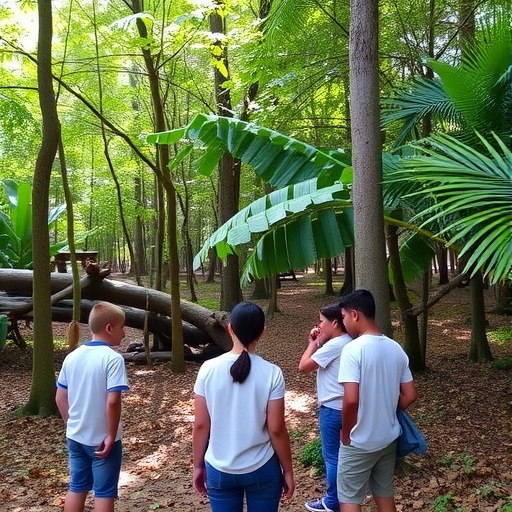Tampa, FL – In an ambitious effort to cultivate the next generation of pandemic preparedness professionals, the Global Virus Network (GVN), in collaboration with the University of South Florida (USF) Youth Experiences and the Hillsborough County Public Schools STEM Department, successfully completed the inaugural “Global Guardians: Youth for Pandemic Preparedness” summer camp. This pioneering program provided an intensive, immersive environment designed to spark scientific curiosity and foster a deep understanding of virology and public health among Tampa’s most promising high school students.
The three-day camp, held from July 23 to 25, 2025, convened fourteen students from grades 9 through 12 to engage with an array of expert virologists, epidemiologists, clinicians, and public health officials. Through hands-on laboratory sessions, simulated outbreak investigations, and critical analysis of media misinformation, the participants were introduced to not only the biological mechanisms underpinning viral transmission but also the socio-political complexities surrounding pandemic response strategies. By combining rigorous science education with practical exposure, the program emphasized an integrative approach to pandemic preparedness.
Central to the educational framework was direct interaction with internationally renowned experts, including Dr. Robert C. Gallo, MD, co-founder of the GVN and a luminary in viral oncology and epidemiology. Dr. Gallo shared his pioneering insights on virus discovery—highlighting his seminal work in identifying HIV as the causative agent of AIDS—and underscored the imperative of cultivating scientific integrity amid the rampant misinformation that challenges public health efforts today. His discussions resonated strongly with the students, reinforcing the ethical responsibilities accompanying scientific inquiry.
The camp’s curriculum was meticulously crafted to offer experiential learning opportunities that bridge theoretical knowledge with applied science. Students toured advanced research laboratories such as the USF Center for Global Health and Inter-Disciplinary Research, the Florida Department of Health Bureau of Public Health Laboratories, and the Hillsborough County Health Department. These visits exposed students to cutting-edge diagnostic technologies, molecular virology techniques, and public health surveillance systems crucial for real-time outbreak detection and response.
One highlight of the program was the immersive laboratory exercises conducted in mock Biosafety Level 3 (BSL-3) facilities. Here, students donned personal protective equipment and simulated handling of pathogenic viral agents, reinforcing critical safety protocols and gaining firsthand understanding of the biocontainment measures essential in virology research. This practical experience is invaluable for demystifying the often abstract realm of high-containment laboratory work.
Moreover, participants engaged deeply with epidemiological modeling, applying mapping tools and case data to reconstruct outbreak scenarios. This exercise challenged them to interpret complex datasets, identify transmission chains, and propose intervention strategies—all fundamental competencies for public health professionals tackling emergent viral threats. The exercise also highlighted the importance of interdisciplinary collaboration across laboratory science, clinical medicine, and data science in pandemic response.
Addressing the challenge of misinformation, sessions on media literacy equipped students with skills to critically evaluate information streams and recognize the pernicious impact of false narratives on public health. These discussions emphasized how scientific knowledge must be communicated effectively to diverse audiences to safeguard community health and foster trust in health authorities.
The program’s instructors praised the students for their exceptional curiosity, analytical thinking, and collaborative spirit. Catherine White, EdD, a K–12 STEM supervisor with Hillsborough County Public Schools, observed that the program was instrumental in transforming rote scientific facts into engaging narratives that empower students to envision themselves as future innovators and problem-solvers in global health.
The impact of the camp extended beyond mere exposure; several students reported a significant shift in career aspirations, with many expressing newfound motivation to pursue advanced studies in medicine, epidemiology, and virology. The hands-on nature of the program, combined with mentorship from distinguished scientists, created a powerful catalyst for their academic and professional development.
Charles J. Lockwood, MD, MHCM, executive vice president of USF Health and dean of the Morsani College of Medicine, lauded the collaboration as a model for integrating community education with institutional expertise. He projected that Global Guardians could become a key contributor to strengthening the pipeline of qualified scientific leaders poised to address future pandemics, especially as the initiative plans to scale statewide and internationally in the coming years.
The founding premise of the Global Virus Network is the recognition of diminishing numbers of emerging scientists in viral research, a trend that imperils global health security. Dr. Gallo emphasized that programs like Global Guardians play a critical role in reversing this decline by providing early, high-quality educational experiences that underscore the scientific rigor and ethical responsibility necessary in virus research.
Looking ahead, GVN intends to expand the program’s reach and accessibility, incorporating merit-based scholarships to empower diverse students from across Florida and beyond. This inclusivity is crucial to cultivating a workforce reflective of the populations disproportionately affected by viral pandemics, thereby enhancing resilience and equity in public health preparedness.
The inaugural Global Guardians summer camp stands as a testament to the power of targeted education and collaboration between academic institutions, public schools, and global scientific networks. By investing in youth education that combines technical knowledge with leadership development, GVN and its partners are laying the groundwork for sustained innovation and vigilance in combating viral threats worldwide.
For those interested in learning more about the Global Virus Network’s educational initiatives and the Global Guardians program, detailed information is available on their official website.
Subject of Research: Viral Pathogenesis and Pandemic Preparedness Education
Article Title: Igniting Scientific Curiosity: The Global Guardians Initiative Empowers Future Leaders in Pandemic Preparedness
News Publication Date: August 20, 2025
Web References:
- https://gvn.org/global-guardians-youth-for-pandemic-preparedness/
- https://www.usf.edu/innovative-education/yxp/index.aspx
- https://www.hillsboroughschools.org/page/stem-science-technology-engineering-and-mathematics/
- http://www.gvn.org
Keywords: Human Health, Clinical Medicine, Virology Education, Pandemic Preparedness, Viral Transmission, Epidemiology, Public Health, STEM Education, Scientific Integrity, Outbreak Investigation




